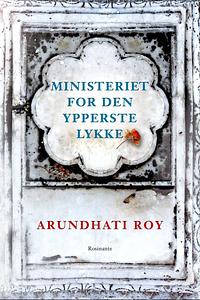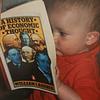You need to sign in or sign up before continuing.
Take a photo of a barcode or cover
Disclaimer: I do not like Arundhati Roy.
I should have listened to myself and not picked up this book. But given how much I really enjoyed 'The God of Small Things', I tricked myself into believing Roy would be able to deliver another masterpiece.
Nope.
This book is just a mouthpiece for Roy's politics.
I am not against political books but it should be organic, character-driven and make some sense.
"Things Fall Apart" by Chinua Achebe is a political book but it makes sense.
I can't make myself read this drivel any further.
I should have listened to myself and not picked up this book. But given how much I really enjoyed 'The God of Small Things', I tricked myself into believing Roy would be able to deliver another masterpiece.
Nope.
This book is just a mouthpiece for Roy's politics.
I am not against political books but it should be organic, character-driven and make some sense.
"Things Fall Apart" by Chinua Achebe is a political book but it makes sense.
I can't make myself read this drivel any further.
This is a great story that explores the fascinating cultural history of India, intersex culture, and the complex class narrative. It's an important story to read.
dark
emotional
informative
mysterious
reflective
sad
tense
slow-paced
Plot or Character Driven:
Character
Strong character development:
Complicated
Loveable characters:
Yes
Diverse cast of characters:
Yes
Flaws of characters a main focus:
Yes
Very good. Not as coherent nor compelling compared to "The God of Small Things", but fantastic nonetheless. I found the shifts in perspective and the jumping around of the story extremely disorienting, and it was hard to see it as a cohesive project. This, I think, is highly intentional, in a story about those cast away from family, society and life. I love that this book tracks a trans woman with such boundless compassion. Tragic, hopeful, tragic, hopeful. Not written in absolutes, lives change drastically from one moment to the next. A meaningful insight into what it is to be human.
The colourful graveyard community from various edges of various societies. Kashmiri life and death and endless war. Many worlds of secret lives and shelters and shatterings.
The vividness of these characters and immensity of Roy's scope are really powerful together. And I bet this would be even more compelling if I'd read more of Roy's nonfiction about Kashmir separatism! A lot of history I felt that I should know but totally don't. But the characters are GREAT and the imagery is intense and unusual and shocking. And it is pretty terrific to read a book where the main people are two women (one intersex/trans) who are so funny and brave and fearlessly odd. Worth it! Even though you will probably get bogged down in the middle section that is less about the two ladies and more of that immense scope stuff, much of which is heartbreaking. The ending is rewardingly lovely! And she does some incredible sort of "found literature" in the middle that is diaries and articles and kind of marginalia and it's witty and moving.
I so expected to love this book. I loved “God of Small Things” and several of my all-time favourite books are by Indian authors. So after approaching it full of anticipation and expectations, it pains me to say that I found it almost unreadable. Which is feel sure is more about me and my failure as a literary reader. But I did not “get” it.
The book is about a disjointed trio on the margins of society, people who have no people, who come together and make a new home in a Delhi graveyard. Anjum is a hermaphrodite who considers herself a “counterfeit woman” and who longs to be a mother. Saddam Hussein hero-worships the dictator Saddam Hussein and has renamed himself in his honour. And Tilo’s great love is a Kashmiri terrorist.
It’s an extremely disjointed novel, more like a collection of barely related stories that move backwards and forwards in time, which gradually weave themselves together to allow you to spot the common threads. Along the way we are introduced to dozens of characters and for almost every one we will be given their back story, whether it is relevant or not. There is a lot of “what happened” and not a lot of dialogue.
Essentially this is a book without a plot and if you realise that going in, you’ll probably struggle less with it than I did. The writing is lovely: scenes are described in such a way that you’re there, you see what the characters are seeing. Even characters who make only a brief appearance are brought vividly to life. The instability in Kashmir and its effect on the people who live there is chillingly portrayed – when an ear infection means you could get shot because you can’t hear the instructions from the checkpoints.
I finished it and I feel a sense of accomplishment for doing so, but would I recommend it? No not really.
The book is about a disjointed trio on the margins of society, people who have no people, who come together and make a new home in a Delhi graveyard. Anjum is a hermaphrodite who considers herself a “counterfeit woman” and who longs to be a mother. Saddam Hussein hero-worships the dictator Saddam Hussein and has renamed himself in his honour. And Tilo’s great love is a Kashmiri terrorist.
It’s an extremely disjointed novel, more like a collection of barely related stories that move backwards and forwards in time, which gradually weave themselves together to allow you to spot the common threads. Along the way we are introduced to dozens of characters and for almost every one we will be given their back story, whether it is relevant or not. There is a lot of “what happened” and not a lot of dialogue.
Essentially this is a book without a plot and if you realise that going in, you’ll probably struggle less with it than I did. The writing is lovely: scenes are described in such a way that you’re there, you see what the characters are seeing. Even characters who make only a brief appearance are brought vividly to life. The instability in Kashmir and its effect on the people who live there is chillingly portrayed – when an ear infection means you could get shot because you can’t hear the instructions from the checkpoints.
I finished it and I feel a sense of accomplishment for doing so, but would I recommend it? No not really.
challenging
emotional
reflective
sad
tense
slow-paced
Loveable characters:
Yes
Diverse cast of characters:
Yes
Flaws of characters a main focus:
Complicated
3.5 stars. Rounded up for the laugh out loud moments. An odd, strangely compelling book. I am not sure I am better for having read it, but I now have a greater understanding of Kashmir history ...
mysterious
medium-paced
Plot or Character Driven:
Character





